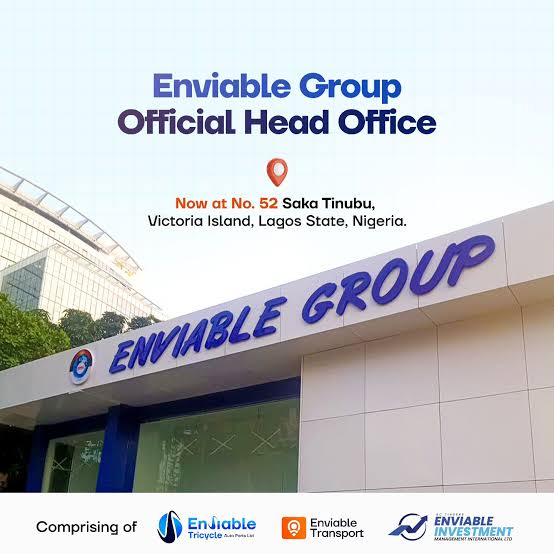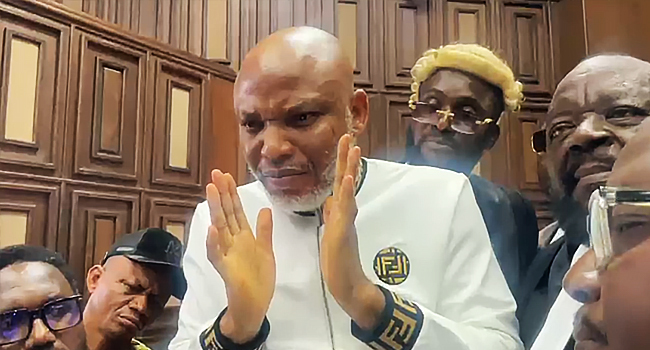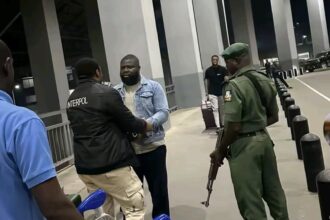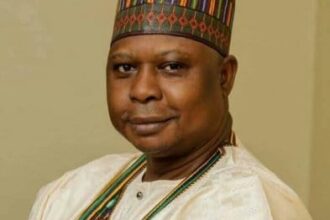
Accuses Justice Omotosho of Procedural Violations, Says Trial Undermines Constitution and Rule of Law
The Global Defence Consortium representing the detained leader of the Indigenous People of Biafra (IPOB), Mazi Nnamdi Kanu, has accused the Federal High Court in Abuja of persistent bias, irregularities, and denial of fair hearing in his ongoing trial.
In a strongly worded statement released on Friday by Barrister Onyedikachi Ifedi after the court’s sitting, the defence team alleged that the events of the day once again “exposed the structural injustice and procedural violations that have marred the ongoing proceedings” before Justice James Omotosho.
Related posts:
- FG Transfers Nnamdi Kanu to Sokoto Prison After Life Imprisonment Verdict, Sparks Outrage and Fresh Legal Battle
- Nnamdi Kanu Is Fighting ‘Darker Forces’ Than Nelson Mandela Faced – Wife Uchechi Declares
- Bianca Ojukwu calls for calm, dialogue after Nnamdi Kanu’s conviction
- Traditional Rulers in Umuahia Demand Presidential Pardon and Release of Nnamdi Kanu
According to the statement, the hearing revealed what the lawyers described as “a pattern of judicial conduct that undermines due process and the fundamental rights of the defendant.”
Disengagement of Legal Team and Denied Access to Case Files
The defence revealed that during Friday’s proceedings, Kanu informed the court that his legal team had been disengaged just a day before the hearing. The development, they said, placed him in a difficult position as Thursday — the day preceding the sitting — was not a visitation day at the Department of State Services (DSS) detention facility where he is held, making it impossible for him to access his legal documents or consult new counsel.
The statement added that both Kanu’s Special Counsel and his brother, who usually deliver legal files to him, are currently in government custody, further restricting his access to legal materials.
“The right to adequate time and facilities to prepare for one’s defence is a constitutional entitlement under Section 36(6)(b) of the 1999 Constitution, not a privilege or favour,” the consortium stated. “To deny an accused person this right in a capital offence trial is not only unjust but a fundamental violation of due process.”
Request for Extended Consultation and Medical Access
Kanu’s team noted that the IPOB leader requested an extension of his legal and medical consultation days from three to five per week, citing inadequate time for meaningful engagement with his lawyers and doctors.
Justice Omotosho reportedly granted this request but claimed that Kanu had failed to utilise earlier opportunities for consultation provided by the court.
The defence, however, disagreed, describing the judge’s remark as “a gross misrepresentation of facts.”
“It is unreasonable to compel a defendant facing capital charges to proceed with his defence after only three hours of consultation,” the statement read. “Such an approach is perverse and contrary to established judicial precedent as laid down in Abacha v. State (2002).”
Allegations of Surveillance and Interference by the DSS
The Global Defence Consortium also raised serious concerns about what it described as “continued bugging and surveillance” of privileged conversations between Kanu and his legal team by the DSS.
The defence alleged that this constitutes a direct violation of Sections 35 and 36 of the Nigerian Constitution, as well as Rule 14 of the United Nations Basic Principles on the Role of Lawyers, which guarantees confidentiality in lawyer-client communication.
“It is alarming that even under judicial supervision, the DSS continues to record and monitor private discussions between Mr. Kanu and his counsel,” the statement said. “This represents not only a violation of his rights but a broader threat to the sanctity of legal defence in Nigeria.”
Violation of Fair Hearing and Judicial Overreach
The defence team argued that Justice Omotosho’s admission during proceedings — that he vacated his courtroom to allow Kanu to meet with his lawyers — was itself proof that the defendant’s right to fair hearing had been breached.
“Once a breach of fair hearing is established, the court is bound to terminate proceedings,” the statement quoted, citing Madukolu v. Nkemdilim (1962) and Tukur v. Government of Gongola State (1989) as legal authorities supporting this position.
Despite this, Justice Omotosho reportedly insisted that there was no sufficient evidence before him to warrant halting the case, a stance the defence described as “illogical and inconsistent.”
“It is ironic that the court claims there is no proof of breach while the pending motion challenging its jurisdiction remains unheard,” the statement noted. “This contradiction reinforces the perception that the trial is being conducted in bad faith.”
Unresolved Applications and Denied Witness Access
The defence consortium further lamented that several critical applications before the court remain unaddressed, including their request to facilitate the appearance of expert and factual witnesses from the United States, the United Kingdom, Kenya, and Ethiopia.
According to the statement, the court’s silence on this matter “reinforces the perception of a deliberate effort to frustrate the defence’s case and obstruct the presentation of material evidence.”
“The refusal to entertain these applications violates both domestic and international fair trial standards,” the team added.
Controversy Over Certified True Copies and Abrupt Adjournment
The consortium also alleged that when Kanu requested Certified True Copies (CTCs) of the court’s transcript and rulings to enable him to proceed on appeal, Justice Omotosho abruptly adjourned the matter, called another case, and ordered Kanu to leave the courtroom.
“This act,” the defence team said, “is reminiscent of contempt for open justice and violates Section 36(1) of the Constitution, which guarantees public hearing and access to court records.”
They accused the court of attempting to suppress transparency by denying the defence access to official records, thereby frustrating their right to appeal.
Claims of Judicial Bias and Erosion of Public Trust
The defence consortium described the conduct of Friday’s proceedings as a continuation of “judicial irregularities that erode public confidence in the impartiality of the court.”
It maintained that Justice Omotosho’s handling of the trial has created the impression of predetermined bias against the defendant, further deepening public scepticism about Nigeria’s justice system.
“The judiciary must be the last hope of the common man,” the statement emphasized. “But when judicial officers become complicit in executive overreach, the entire system collapses under the weight of injustice.”
The consortium reiterated that its position is not an attack on the court but a legitimate defence of the rule of law, fairness, and constitutionalism.
“Our duty as defence counsel is to ensure that due process is observed,” it said. “We will continue to expose procedural violations and structural injustices that undermine the credibility of this trial.”
Call for International Attention and Rule of Law Compliance
The defence appealed to the international community, human rights organisations, and the Nigerian Bar Association (NBA) to take note of the “systemic violations” occurring in Kanu’s trial.
It also called on the Federal Government to ensure that all judicial processes relating to the IPOB leader adhere strictly to constitutional provisions and international human rights norms.
“The world must see that justice in Nigeria is not selective or political,” the statement declared. “What is at stake is not just the liberty of one man but the integrity of the nation’s justice system.”
The statement concluded with a pointed message to the public:
“These are the facts from today’s proceedings. Don’t let them feed you lies.”
The latest allegations by Nnamdi Kanu’s defence team add to ongoing controversies surrounding his protracted detention and trial since his extraordinary rendition to Nigeria in 2021. As the matter continues, calls for transparency, fairness, and judicial independence remain at the centre of public debate on the case.




